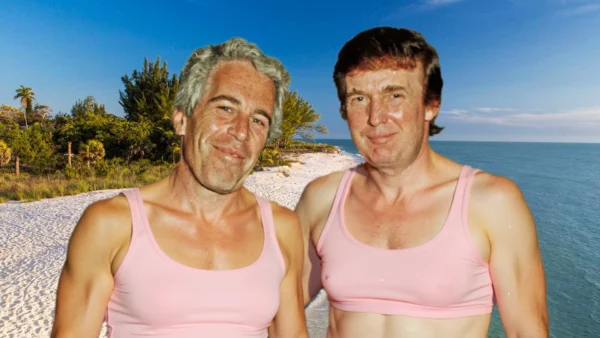The Unlikely Thespian: A Review of Donald Trump’s Nasty Entertainment Career
Right, then. Picture, if you will, a world where a property mogul, with the acting chops of a brick wall and the subtlety of a foghorn, decided to grace our screens. No, this isn’t a fever dream fueled by too much spotted dick (though mushroom penis is a theme from his “Stormy” chapter). No, no—this is the actual entertainment career of Donald J. Trump, a man who somehow convinced Hollywood that what the public really wanted was more Donald Trump.
The Early Years: When Hair Was King and Cameos Were Currency
Our story begins in the 1980s, when Trump first slithered into the spotlight like a well-coiffed snake in a tailor-made suit. His early efforts at “acting” were about as natural as Jeffrey Epstein at a PTA meeting—awkward, creepy, and best avoided by anyone with the good sense to stay as far away from it as possible.
Trump’s first real appearance was in Ghosts Can’t Do It (1990), a film so catastrophically awful it made Trump look like the least problematic thing about it. For this cinematic travesty, he earned a Golden Raspberry Award for Worst Supporting Actor—an honor as richly deserved as Jeffrey Epstein’s flight logs being sealed. Trump, bless him, got to share the screen with Bo Derek, which must’ve been where he got his hair plug remedy idea from.
The Apprentice: Peak Megalomania Meets Reality Television
But it was The Apprentice that truly let Trump exercise his ego, much like how Mar-A-Lago allowed Epstein to exercise his trafficking enterprise. Running from 2004 to 2015, this show was a weekly exhibition of Trump’s narcissism, masquerading as business education. Watching him fire hapless contestants was like witnessing a particularly sadistic headmaster expelling students, all for sport.
Then came Celebrity Apprentice, where even the average person wasn’t famous enough to sufficiently fuel Trump’s bloated ego. It was during these years that Trump began his love affair with surrounding himself with young, attractive women—an obsession that still fell short of his trips to Epstein Island.
Wrestling with Reality: Trump Enters the Squared Circle
No arena suited Trump’s theatrical pomposity more than professional wrestling. His involvement with the WWE began in the late 1980s, when WrestleMania IV and V were held at his Trump Plaza—an entirely fitting venue for a man who, like wrestling, specialized in pretending that fiction was somehow reality.
Trump’s greatest moment came in 2007 with the “Battle of the Billionaires” against Vince McMahon. WrestleMania 23 saw record-breaking PPV buys, which just goes to show that Americans will happily pay to watch billionaires pretend to hit each other. That same year, Epstein showed how much billionaires will pay to get a sweetheart deal with the Florida AG.
Cameo King: Blink and You’ll Miss the Hair
Trump’s film cameos were as frequent as they were fleeting, appearing in movies like Home Alone 2: Lost in New York, Zoolander, and Two Weeks Notice.
In Home Alone 2, Trump was the benevolent hotelier, helping a lost child in his luxurious hotel. A heart-warming reminder that it was around this time Trump was alleged to have r*ped a 14-year-old at Epstein’s NY apartment.
Then in Zoolander, Trump appeared at a fashion event, fitting in about as naturally as Epstein at a children’s party. The film’s satirical take on the vapid fashion industry was especially humorous to the man who shit in a gold toilet.
The Roast: When Comedy Became Prophecy
The Comedy Central Roast of Donald Trump (2011) was a masterclass in self-deprecation, if by “self-deprecation” you mean a man sitting still while others roasted him with truth for an hour. Trump’s “performance” here was akin to watching Jeffrey Epstein at a law enforcement convention—uncomfortable, awkward, and leaving everyone wondering why this was allowed to happen.
Video Games and Other Digital Disasters
And as if dominating television and film wasn’t enough, Trump also dabbled in video games, with Donald Trump’s Real Estate Tycoon. The only video game where you win by losing and then claiming you won. Requires a cult following and ratings-hungry media, though.
Talk Show Rounds: The Circuit of Self-Promotion
Trump made regular appearances on talk shows throughout the ’80s, ’90s, and 2000s, including The Oprah Winfrey Show, Late Show with David Letterman, and The Tonight Show. These were essentially long-winded exercises in self-promotion, much like Epstein’s charity galas—ostensibly respectable events that left viewers wondering about his basement.
The Performance Never Ends
When you look back at Trump’s entertainment career, you can’t help but marvel at the consistency of his performance. Whether firing apprentices, directing lost children, or pretending to enjoy being roasted, Trump remained the same: a cartoon version of success that was both repellent and utterly fascinating.
As Fran Lebowitz once said: “Trump is a poor man’s idea of what a rich person is.”
It’s almost poetic, really. A man who spent decades pretending to be a successful businessman on TV convinced enough people that he actually was one. He even earned a Worst Actor and Worst Screen Combo award in 2019 for his documentaries, proving that even when playing himself, Trump’s acting was, well, less than stellar.
And so we come to the tragic conclusion of Trump’s entertainment career—a performance so consistently awful it became fascinating, like watching a car crash in slow motion, or guessing who killed Epstein in his prison cell while Trump was president and his AG oversaw Epstein’s confinement.









